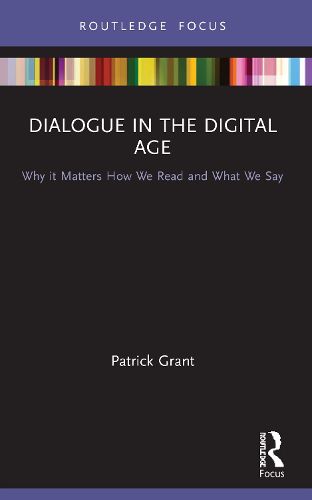Readings Newsletter
Become a Readings Member to make your shopping experience even easier.
Sign in or sign up for free!
You’re not far away from qualifying for FREE standard shipping within Australia
You’ve qualified for FREE standard shipping within Australia
The cart is loading…






Combining literary criticism and theory with anthropology and cognitive science, this highly relevant book argues that we are fundamentally shaped by dialogue. Patrick Grant looks at the manner in which dialogue informs and connects the personal, political, and religious dimensions of human experience and how literacy is being eroded through many factors, including advances in digital technology.
The book begins by tracing the history of evolved communication skills and looks at ways in which interconnections among tragedy, the limits of language, and the silence of abjection contribute to an adequate understanding of dialogue. Looking at examples such as "truth decay" in journalism and falling literacy levels in school, alongside literary texts from Malory and Shakespeare, Grant shows how literature and criticism embody the essential values of dialogue. The maintenance of complex reading and interpretive skills is recommended for the recuperation of dialogue and for a better understanding of its fundamental significance in the shaping of our personal and social lives.
Tapping into debates about the value of literature and the humanities, and the challenges posed by digitalization, this book will be of interest and significance to people working in a wide range of subjects, including literary studies, communication studies, digital humanities, social policy, and anthropology.
$9.00 standard shipping within Australia
FREE standard shipping within Australia for orders over $100.00
Express & International shipping calculated at checkout
Combining literary criticism and theory with anthropology and cognitive science, this highly relevant book argues that we are fundamentally shaped by dialogue. Patrick Grant looks at the manner in which dialogue informs and connects the personal, political, and religious dimensions of human experience and how literacy is being eroded through many factors, including advances in digital technology.
The book begins by tracing the history of evolved communication skills and looks at ways in which interconnections among tragedy, the limits of language, and the silence of abjection contribute to an adequate understanding of dialogue. Looking at examples such as "truth decay" in journalism and falling literacy levels in school, alongside literary texts from Malory and Shakespeare, Grant shows how literature and criticism embody the essential values of dialogue. The maintenance of complex reading and interpretive skills is recommended for the recuperation of dialogue and for a better understanding of its fundamental significance in the shaping of our personal and social lives.
Tapping into debates about the value of literature and the humanities, and the challenges posed by digitalization, this book will be of interest and significance to people working in a wide range of subjects, including literary studies, communication studies, digital humanities, social policy, and anthropology.